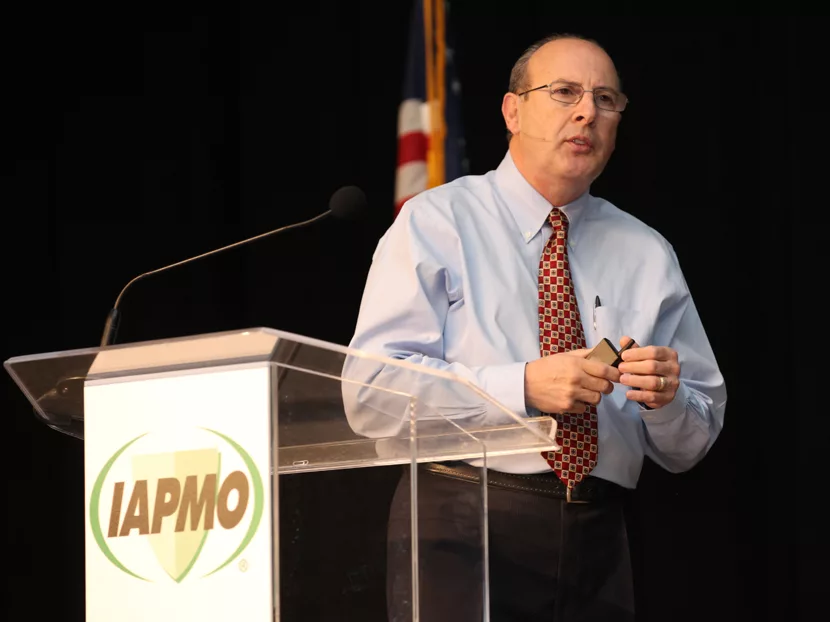In 1995, Russ Chaney, a gentleman with a strong background in the plumbing and mechanical industry, continued his journey by accepting the position of CEO at The International Association of Plumbing and Mechanical Officials (IAPMO). The member-based association's mission is to protect the public's health and safety by working with government and industry to implement comprehensive codes for plumbing and mechanical systems around the world.
The organization fulfills its mission through technician training and certification, product certification and testing, and being at the forefront of the development of codes and standards. The organization recently released its 2021 edition of the Uniform Plumbing Code.
At the time Chaney joined IAPMO, the organization had 22 staff members and a small budget to achieve its goals. It was a challenging start, but he was up for the mission. Fast-forward 25 years, and the group, now with more than 350 staff members, champions its success by becoming an integral part of protecting the health of people around the world.
IAPMO is a complete service organization that provides code development assistance, education, personnel certification, plumbing/electro-plumbing/mechanical product testing and certification, building product evaluation, and a manufacturer-preferred quality assurance program.
Chaney leads the group in its mission, encouraging its team and members to push the boundaries and be the driving force in code development and plumbing health and safety. I sat down with Chaney to discuss IAPMO's changes and accomplishments, and where the organization was headed.
He was quick to note that it was not a discussion of his accomplishments, rather a focus on what the organization has accomplished and where it is heading in the future.
"When I came on board, it was vital to identify and recruit key people in the industry — ones who could move our mission forward," Chaney says. “It was a challenge — we wanted to achieve goals with a limited budget — and we accomplished it with the help of a wonderful team."
Gaining Industry Trust with Quality Codes, Standards
The organization is celebrating its 94th year serving the plumbing and mechanical industry. During that time, it has seen tremendous changes within the industry — both good and bad. "In 2005, we transitioned from reacting to things our competitors were doing to becoming proactive and building upon our technical capabilities to help the industry," Chaney says.
IAPMO is probably best known for its development of the Uniform Plumbing Code (UPC), a code recognized across the industry. The organization brought about the uniformity and consensus of plumbing practices to form a harmonious safe and secure standard. The group continues its focus by remaining vigilant on the development of code standards in changing times. It works to ensure the safety and wellbeing of the public and govern the installation and inspection of plumbing systems as a means of promoting the public's health, safety and welfare.
Development of the code and enforcement go hand in hand. In the late 1990s, Chaney believed that due to trade laws and international governmental changes, a boom in manufacturing products overseas and shipped into the United States would soon take place — either by U.S.-based manufacturers or international manufacturers. Manufacturing abroad presented many challenges: the product could be made at a lower cost, and there was still an issue of monitoring compliance with codes and standards, as well as assurances that testing is done to confirm certification.
"We were looking at the changing environment and realized down the road there would be a need to certify product from overseas," he explains. "We decided in 1998 to open an office in Beijing to provide product testing and certification of companies manufacturing overseas and importing to the United States and Canada.” The office included an independent laboratory that could test foreign-made products to U.S. and Canadian code requirements. It was a big undertaking and the first of its kind.
It was a brilliant move. With testing overseas in an independent laboratory, IAPMO is able to validate code compliance before the product left the country. IAPMO staff went to major U.S. manufacturers with factories in China and discussed how they could work together to ensure the manufacturing process remained in compliance with U.S. and Canadian codes and standards.
"We wanted to help them reduce noncompliant products, which were reducing their sales — and costing them money,” he explains. “IAPMO could be the value-added they needed." To streamline the process, manufacturers worked with IAPMO to put measures in place to ensure product compliance. The first step was to have manufactures place U.S. employees in their plants to oversee the production process. The second step was to have the products tested at the lab overseas before shipment. This two-step process would make certification viable.
"This process gained trust and confidence of product conformity," Chaney says. With this process in place, the confidence catapulted IAPMO and its strict standards of quality and compliance into a level of trust and professional respect. With the blossoming of overseas manufacturing, IAPMO also opened testing labs in India, Indonesia and Australia.
"Technological advances continue to drive product development,” he notes. “Our product certification and testing programs derive value in being able to predict the evolution of product development now underpinned by technology advancement."
IAPMO strives to work with manufacturers to facilitate their product compliance via their certification process. "We continue to evolve our thinking, so we stay ahead of the curve in providing value-added services to assist the manufacturing community and reduce non-tariff trade barriers," he says.
Improving Sanitation Around the World
Clean water and sanitation are fundamental human rights, and IAPMO created a philanthropic arm to give back to communities around the world. In 2014, it formed the International Water, Sanitation, and Hygiene Foundation (IWSH) with a mission to develop frameworks for water and sanitation systems, build a skilled workforce and establish mechanisms for reliable supply chains around the world.
"Our primary goal is to change the lives of people," Chaney says.
The foundation works in partnership with other nonprofit organizations and NGOs to undertake multiple Community Plumbing Challenges every year, both nationally and internationally, from Singapore, Nepal, India, South Africa, and now in the United States. Its most recent project completed at the end of last year was in partnership with the Navajo Nation in Arizona. Dozens of skilled volunteers, IWSH staff and community leaders worked in a remote area that was challenging at best to access.
"It was located miles off of a dirt road, in the middle of nowhere," Chaney recalls. Without access to sewers or running water, the IWSH and DigDeep (an NGO) installed potable water and septic systems for the residents. The project was made possible by donations from Ferguson, which contributed supplies that are part of its ongoing partnership with IWSH and DigDeep. Also, manufacturers assist IWSH through generous financial contributions.
Volunteers also are from the organizations themselves; many times, staff members will join in the projects. "It was amazing to see the eyes of a 90-year-old grandmother who never saw indoor running water,” Chaney says. “We were able to fulfill our promise made to the Navajo Nation." Also, by focusing on improving sanitary conditions, Chaney points out that it is essential for the health of communities.
Many diseases are spread through improperly installed plumbing systems, and he points to the link between Severe Acute Respiratory Syndrome (SARS) and a faulty plumbing system design. With the recent Coronavirus soon becoming a pandemic, Cheney's position on the importance of sanitary standards and plumbing code was evident. "Ensuring the public’s health and safety is our primary mission. Developing and maintaining enforceable, practical science based, comprehensive codes and standards are key to achieving compliance," he explains.
While IAPMO’s primary goal is to change the lives of people by providing a healthy living environment, Chaney explains there is a second goal. "We invite state and federal politicians to our projects for them to see firsthand the before and after," he says, so they can understand that "we can and need to do better."
IWSH has many projects in the works and has no plans for stopping. "It has helped us to place a spotlight on our industry — making a difference in the lives of others," Chaney says. It also has helped in highlighting the skilled trades as a viable career path.
Spotlighting Plumbing Careers
"It's all about perception and shifting perspective on this industry,” Chaney notes. “You can connect with any generation or an individual if your company's mission aligns with their core values. Now, you have hooked them into considering the skilled trades and its impact it has on environmental concerns.”
Focusing attention on the plumbing industry and the skilled trades and drawing attention to its viability as a successful and fulfilling career path, is at the forefront of industry leaders. "The contributions we make to society every day change lives," Chaney says. He adds that focusing attention on the social changes and impacts the organization (and full industry) has had on global health attracts the attention of individuals who strive to find a profession that aligns with personal purpose.
"We need to start in grade school, to shine a light on the contributions our industry makes to the public health, and how we make an impact," Chaney states. "When you start to talk about the future and what it is going to look like, individuals want to be involved in environmental health and feel they are making an impact."
One doesn't immediately think of plumbing when discussing environmental health. Still, when you talk about how plumbing codes change the livelihood of communities, and how designing, manufacturing and installing these products can change lives — then you connect it with an eco-friendly environment and garner the attention of younger generations. "You have got to make it attractive, and you need to inspire them and let them know this is an honorable and major contribution to society," Chaney explains.
Attracting talent to the industry is also dependent upon more women entering the trades, from the skilled trades to the board room. "By shining the spotlight about how we are all working collaboratively and collectively to make a change, it shows the evolution of the perception of plumbers," he says.
IAPMO has collectively grown over the past 25 years and has attracted more women to work for the organization. Also, with plumbing organizations strengthening their Women in Industry groups, it benefits the health and vitality of the profession.
He expounds on how all segments of the industry — contractors, engineers, suppliers, manufacturers, plumbers and distributors — cannot have success if they do not work collaboratively.
"This will achieve our long-term success,” Chaney notes. “We have a good story to tell, and we need to keep telling it. IWSH is a great example of spreading the word. It reflects positively on what the plumbing industry does to contribute to public health and safety."





